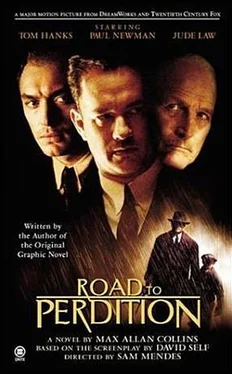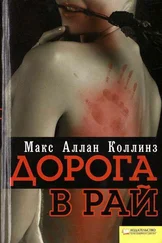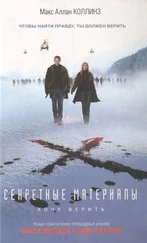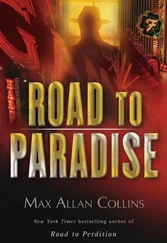Arms outstretched, there was a certain Pagliacci posture about the corpse that appealed to the photographer’s sensibilities. This would be too much for the Herald-American , but the editor over at Startling Detective would pay through the nose — crimes of passion burned up the newsstands.
With swift precision he assembled his tools, camera out of its case, tripod legs extending, bellows growing, and soon the artist was ready to go to work. To create something permanent out of the temporary, to make a sort of life out of death.
But that bastard husband was still ranting, hands in the air, pacing around. “I tell you, it was self-defense! You saw her — her clothes ripped off. He was raping her, I tell you!”
A cop was trying to contain the guy, saying, “Come on, buddy! Hold still — you’re tramplin’ on the evidence.”
“ Hey! ” Maguire said. “Could the deceased and I have a little peace and quiet? Trying to work in here. Let a guy make a living.”
He’d already slipped the cop — O’Ryan, who Maguire had run into on several prior occasions — a sawbuck, coming in.
“Maguire,” O’Ryan said, “we’re all just trying to do our jobs.”
The photographer went over and pressed another sawbuck into the cop’s palm. “Why don’t you do yours out in the hall?”
“No reason why not,” the cop said, pleasantly, and hauled the killer’s ass out of there, the medic tagging after.
Then it was only the photographer and his subject, who was not likely to give him any problems. Maguire stepped behind the tripod and began to focus, the image of the corpse upside-down in his viewfinder.
“Now smile,” Maguire said softly.
But just as he was about to take his shot, Maguire heard a bubbling gasp... and he stepped from behind the camera and took a right-side up look at the stiff.
Only this wasn’t a stiff: the oaf was gulping for air, blood bubbling, trickling.
Maguire shook his head — son of a bitch was ruining everything. What was a crime of passion without a murder? He glanced at the closed door, and the rumble of an approaching train out on the El already was blotting out the pitiful groans of the uncooperative would-be corpse.
The photographer took a handkerchief from his pocket, then knelt over the victim; the man’s open eyes had lost their blankness, consciousness glimmering. So Maguire covered the man’s bloody mouth with the hanky-in-hand, cupping it, and with his other hand squeezed the victim’s nose closed.
As the El thundered past, the oaf struggled a little — not much, he’d have probably croaked on the way to the hospital, anyway — and Maguire looked into the man’s eyes, watching the consciousness wink out, like the wind quenching a candle.
Then he wiped the fresh blood from the corpse’s face, wadded up the handkerchief, slipped it in his pocket, and got back behind the tripod — with no more prima donna malarkey from his subject.
As his father drove the rural off-roads, Michael rode in the backseat, so he could stretch out and nap or just rest, if he felt like it. But right now he was wide awake, and he was glad when Papa — after a long interval of silence — struck up a conversation.
“Do you remember your Aunt Sarah? Your Uncle Bob?”
He sat forward, leaned on the seat. “I’m not sure... ”
“Your mother’s sister, in Perdition. Bob is her husband — your uncle... your real uncle.”
“ Per what?”
“Perdition. It’s in Kansas. A little farm, next to a lake?”
“Was I little?”
Papa nodded. “We went there, all of us, when you were four, maybe five. Perdition’s a bump in the road, near Fall River Lake. Peter was just a little tyke. It’s beautiful... Do you remember?”
“Do they have a dog?”
Papa glanced back him, puzzled. “I’m not sure.”
“Well, the place I remember, they had a dog and it jumped up at the table and took a bite out of Mama’s sandwich.”
His father glanced at him again, a tiny, tiny smile forming.
“And so Mama gave it to him,” the boy continued. “I mean, once the dog took a bite, it was his, she said.”
Michael could still remember their laughter, at the time; but he didn’t feel like laughing, now. Neither did Papa, apparently. Because he was just staring at the road.
After a while, Michael asked, “What about it?”
“What about what?”
“Per... Perdition.”
“Oh. Well... that’s where we’re going.”
But that night they stayed in McGregor, Iowa, just another “bump in the road” with a town square and quiet streets. The Starr Motel was toward the edge of the little farming community, a typical roadside motor court. The room was clean but the furnishings were old and cheap, the lighting dim and yellowish, the covers and sheets worn, the kerosene space heater smelly, and, when the boy sat on the edge of the bed and its thin mattress, the springs squeaky. When they had traveled with Mama and Peter, the family stayed in nicer places than this. Not that he cared. The boy was preoccupied: he knew, he just knew, that his father was going to dump him at that place on some lake with this aunt and uncle who he barely remembered.
His father was sitting in a chair by the dresser next to the door, leaning forward, hands folded, thinking. The boy knew he probably shouldn’t say anything. Then he did: “Papa — how long will we be staying at Aunt Sarah’s?”
He looked up, paused, then finally said, “Michael, you’ll be staying there... I won’t. Not right away.”
Michael didn’t argue with his father — what good would it do? He just said, “How long are you going to leave me there?”
“I don’t know. Until it’s safe.”
“How will you know it’s safe?”
“I’ll know,” he said firmly, and stood. “Son, I have to use the phone, in the motel office... You know what to do, if anyone comes through that door.”
Michael nodded and got up to get his jacket from the chair he’d draped it over. The boy took the revolver from the pocket and went back to the bed, setting the gun next to his Tom Mix Big Little Book on the nightstand.
His father was at the door when Michael asked, “Who are you calling, Papa?”
“Your Uncle Bob. To let him know we’re coming for a visit.”
And Papa went out, leaving the boy to think how normal that had sounded.
In the motel office, O’Sullivan gave the desk man a five-dollar bill to cover the long-distance call.
The farmer’s husky voice, over the crackling wire, was strangely soothing to O’Sullivan’s ear. “Sarah’s in Rock Island, Mike... in your house. Seeing to the services for Annie and little Pete.”
“That’s damn decent of you, Bob.”
“Wish we could do more. I wanted to go myself, the train fare for one purt’ near broke us.”
“I’ll help you out, when I see you.”
“I didn’t mean... When will that be?”
And O’Sullivan explained how he hoped he could entrust his son to the couple, until he worked out his “problem” with the Looney family.
“You know we’ll love to have the lad, Mike — we never had any of our own. It might be a balm for Sarah’s busted heart.”
“I know she loved Annie.”
“Loved her like life itself. Guess I don’t have to tell you what a saint Annie was — not a spoiled bone in her body, even if she was the younger girl, the baby... ”
O’Sullivan couldn’t hear any more of that. “Bob, before I turn Michael over to you, we have to make sure it’s safe.”
“Not sure I understand.”
“Looney’s men... maybe Capone’s men... may be watching your house. They could be staying in town... ”
“Understood. Give it a couple days and call me back — if the crows are sittin’ on the fence, eyes on the corn, this old farmer’ll spot ’em.”
Читать дальше












